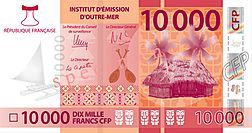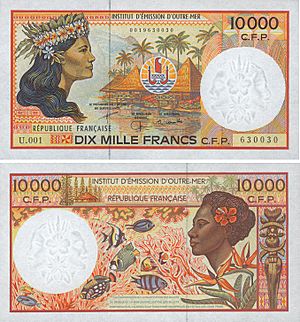CFP franc facts for kids
Quick facts for kids CFP franc |
|||
|---|---|---|---|
|
|||
| ISO 4217 Code | XPF | ||
| User(s) | |||
| Inflation | 0% (French Polynesia 2015 est.), 1.9% (New Caledonia 2017 est.) | ||
| Source | The World Factbook | ||
| Pegged with | F 1,000 = €8.38 | ||
| Subunit | |||
| 1⁄100 | centime | ||
| Symbol | F | ||
| Coins | F 5, F 10, F 20, F 50, F 100, F 200 | ||
| Banknotes | F 500, F 1,000, F 5,000, F 10,000 | ||
The CFP franc is the money used in some French territories in the Pacific Ocean. These places are French Polynesia, New Caledonia, and Wallis and Futuna. People usually just call it the franc.
The letters CFP used to stand for "French colonies of the Pacific." But since 2022, they officially mean "French Communities of the Pacific." Its special code, used around the world for money, is XPF. The CFP franc can be divided into 100 centimes, but there are no actual centime coins. The Institut d'émission d'outre-mer (IEOM) is in charge of printing and issuing this money.
Contents
History of the CFP Franc
How the CFP Franc Started (1945–1949)
The CFP franc was created in December 1945. This happened right after World War II, when the French money (the French franc) was very weak. France decided to set a fixed value for its money against the United States dollar.
To protect its faraway territories from this big change, France created new currencies for them. The CFP franc was special because it was directly linked to the US dollar. This was important because the US dollar was widely used in the Pacific during the war. Later, in 1949, the CFP franc was given a fixed value against the French franc instead.
Changes Over Time (1949–1985)
Since 1967, the Institut d'émission d'outre-mer (IEOM) has been the official issuer of the CFP franc. The IEOM's main office is in Paris, France.
At first, the money was slightly different for each territory. There were distinct versions for French Polynesia, New Caledonia, and the New Hebrides. Wallis and Futuna used the New Caledonian franc.
Banknotes were first made in values of 500, 1,000, and 5,000 francs. The banknotes for French Polynesia and New Caledonia looked very similar. You could only tell them apart by the name of their capital cities, Papeete or Nouméa, printed on the back.
In 1969, the New Hebrides franc became separate from the CFP franc. It was later replaced by the Vanuatu vatu in 1982, after Vanuatu became an independent country.
Modern CFP Franc (Since 1985)
The largest banknote, the 10,000 CFP franc note, was first made in 1986. This note did not have a city name on it. Later, the 500, 1,000, and 5,000 franc notes also stopped showing city names.
In 2014, new designs for banknotes were introduced. These new notes were smaller and looked the same in both New Caledonia and French Polynesia. One side of the banknotes shows beautiful places or important people from French Polynesia. The other side shows scenes from New Caledonia.
Before 2023, there were two different sets of coins. One set was for New Caledonia and the other for French Polynesia. Even though they looked different, you could use either set of coins in all three French territories.
The letters CFP have changed their meaning several times. It started as "French colonies of the Pacific." Then it became "Pacific Financial Community," and later "Pacific Franc Exchange." Since February 2022, it officially means "the franc of the French Communities of the Pacific."
In 2021, a new series of smaller coins was released. These coins have a single design that is used across all three territories. The 1 and 2 franc coins were stopped. A new 200 franc coin was introduced. The old coins were taken out of use in January 2023.
How the Value Changed Over Time
The CFP franc has had a fixed value against other currencies for a long time.
- 1945 to 1949: It was linked to the US dollar. One US dollar was worth 49.60 CFP francs.
- 1949 to 1998: It was linked to the old French franc. One CFP franc was worth 5.50 old French francs. When France changed its currency in 1960 (100 old francs became 1 new franc), the value became 1 CFP franc = 0.055 new French francs.
- 1999 onward: It is now linked to the euro. One thousand CFP francs are worth exactly €8.38. This value has stayed the same since the euro was introduced.
The value of the CFP franc compared to the French franc or the euro has not changed since 1949. Only the currency used in France changed.
CFP Franc Coins
In 1949, New Caledonia and French Polynesia started making their own coins. The front (obverse) of the coins was the same for both. But the back (reverse) had different designs. You could use these coins in any of the three French territories. This is similar to how euro coins work, where each country has its own design but the coins can be used everywhere in the eurozone.
Until 2021, the IEOM made two sets of CFP coins. These were in values of 1, 2, 5, 10, 20, 50, and 100 francs. The New Caledonian coins had "Nouvelle Caledonie" on the back. They were mostly used in New Caledonia and Wallis and Futuna. The French Polynesian coins had "Polynesie Française" on the back. They were used in French Polynesia. The designs on the back showed local landscapes, plants, or animals.
The front of all coins had "Republique Français" (French Republic). It also showed a goddess like Minerva or Marianne, who represents France. The year the coin was made and the IEOM's initials were also on the front.
The 1, 2, and 5 franc coins were made of aluminium alloy. The 10, 20, and 50 franc coins were made of nickel. The 100 franc coin was made of nickel bronze.
New Coins (2023 Onwards)
In September 2021, a new single set of coins was released. These coins are used in all three French Pacific Territories. They replaced the two older sets of coins. The 1 and 2 franc coins are no longer made. A new 200 franc coin was introduced. The old coins were removed from circulation in January 2023.
Since the smallest coin now is 5 francs, cash payments are rounded.
- If a price ends in 1 or 2 francs, it is rounded down to 0.
- If it ends in 3 or 4 francs, it is rounded up to 5.
- If it ends in 6 or 7 francs, it is rounded down to 5.
- If it ends in 8 or 9 francs, it is rounded up to 10.
- If it ends in 0 or 5 francs, it stays the same.
This rounding rule only applies to cash payments. Electronic payments are still exact.
The front of the new coins has a wavy line design. The IEOM and the year are around the edge, with the coin's value in the middle. Each coin has a unique design on the back. These designs show landscapes, items, plants, and animals from all three territories.
| Coins of New Caledonia, Wallis & Futuna, and French Polynesia (2021–) | ||||||||||
|---|---|---|---|---|---|---|---|---|---|---|
| Image | Value | Technical parameters | Description | Common name | ||||||
| Obverse | Reverse | Diameter | Thickness | Mass | Composition | Edge | Obverse | Reverse | ||
 |
 |
F 5 | 21 mm | 1.9 mm | 4.8 g | stainless steel | Plain | wavy-line design | tiare and frangipani flowers, Cook pines, taro leaves | F 5 |
 |
 |
F 10 | 23 mm | 1.7 mm | 5.6 g | cupronickel | Milled | wavy-line design | Sail canoe, white terns, rays, oysters | F 10 |
 |
 |
F 20 | 26 mm | 1.7 mm | 7.1 g | Napoleon fish, angelfish, turtles, reef fish | F 20 | |||
 |
 |
F 50 | 24 mm |
2.0 mm | 6.6 g | cupronickel-aluminium | Plain | wavy-line design | Kagu, horned parakeets, breadfruit, ferns, niaouli | F 50 |
 |
 |
F 100 | 27 mm | 2.0 mm | 8.3 g | Milled | Traditional Faré hut, Polynesian items | F 100 | ||
 |
 |
F 200 | 25 mm | 2.3 mm | 8.5 g | Bimetallic: cupronickel ring, cupronickel-aluminium centre |
Milled | wavy-line design | Tiki, log drum, ukulele, Wallis tapa cloth | F 200 |
| These images are to scale at 2.5 pixels per millimetre. For table standards, see the coin specification table. Source: Numista. See New Caledonian franc and French Polynesian franc for previous coin series. | ||||||||||
CFP Franc Banknotes
The IEOM started printing banknotes for New Hebrides in 1965. Then, in 1969, they began printing notes for New Caledonia and French Polynesia. These notes came in values of 500, 1,000, and 5,000 francs. In 1986, the 10,000 franc banknote was introduced. This note was the same for both French Polynesia and New Caledonia.
Between 1992 and 1995, new designs for the 500, 1,000, and 5,000 franc banknotes were made. These new designs were also common to all French Pacific Territories. One side of the banknote shows landscapes or important people from New Caledonia. The other side shows scenes from French Polynesia.
In January 2014, the IEOM released a brand new series of banknotes. The older notes were taken out of use on September 30 of that year. However, you can still exchange the old notes for new ones at IEOM offices.
| Image | Value | Dimensions (millimetres) |
Main colour | Design | ||||
|---|---|---|---|---|---|---|---|---|
| Obverse | Reverse | Obverse | Reverse | |||||
| F 500 | 120 × 66 mm | Green | Frangipani, tiare | Kava, bird of paradise | ||||
| F 1,000 | 126 × 66 mm | Orange | Horned parakeet, kagu | stingray, sea turtle | ||||
 |
 |
F 5,000 | 132 × 73 mm | Blue | Nautilus, pennant coralfish, volute and murex shells |
Napoleonfish, coral, oyster with pearl |
||
 |
 |
F 10,000 | 138 × 73 mm | Red | Jean-Marie Tjibaou Cultural Centre, Kanak hut |
Crossed oars, faré, palm trees | ||
| These images are to scale at 0.7 pixel per millimetre. For table standards, see the banknote specification table. Source: Numizon. | ||||||||
The Tārā Unit
Before the French government set up official money rules in Tahiti, traders often used dollars. The word dollar became tārā (or tara) in the local Tahitian language. This term is still used today by some local traders as an unofficial unit. One tārā is worth 5 francs. So, if something costs 200 francs, someone might say "40 tārā" in Tahitian. The money in Samoa is also called the tālā.
| Current XPF exchange rates | |
|---|---|
| From Google Finance: | AUD CAD CHF EUR GBP HKD JPY USD NZD EUR JPY |
| From Yahoo! Finance: | AUD CAD CHF EUR GBP HKD JPY USD NZD EUR JPY |
| From XE.com: | AUD CAD CHF EUR GBP HKD JPY USD NZD EUR JPY |
| From OANDA: | AUD CAD CHF EUR GBP HKD JPY USD NZD EUR JPY |
| From fxtop.com: | AUD CAD CHF EUR GBP HKD JPY USD NZD EUR JPY |
See also
 In Spanish: Franco CFP para niños
In Spanish: Franco CFP para niños
- CFA franc
- Currencies related to the euro
- French Polynesian franc
- Monetary union
- New Caledonian franc
- New Hebrides franc
 | James Van Der Zee |
 | Alma Thomas |
 | Ellis Wilson |
 | Margaret Taylor-Burroughs |






